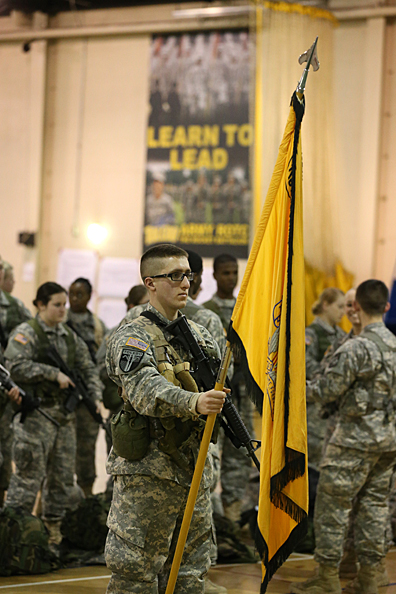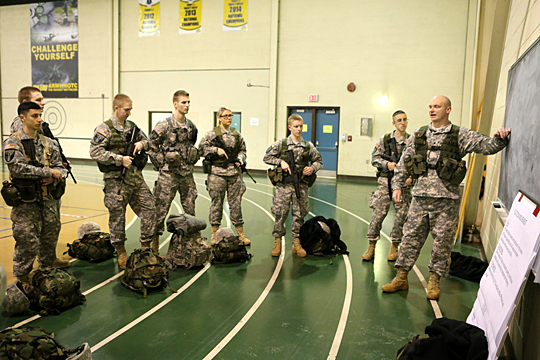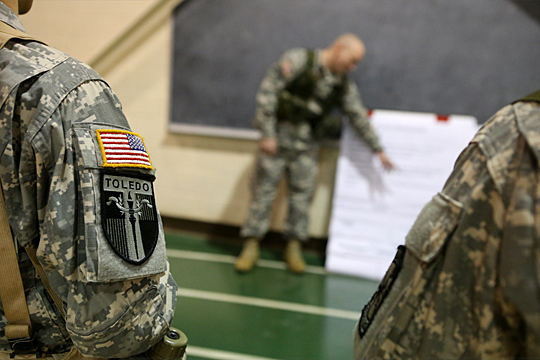Since 1947, the Army ROTC at The University of Toledo has commissioned more than 2,000 lieutenants.

Cadet Pvt. Marcus Masello, a freshman majoring in information technology, held the Rocket Battalion colors during a recent training exercise on platoon movement.
“There’s no typical cadet,” said Maj. Chris Mugavero, professor and chair of the UT Department of Military Science. “Any student on campus can start; they might not all become officers, but they can come and learn leadership and discipline.”
Mugavero said the focus of ROTC is more about helping students to learn leadership than it is about learning military techniques. The program even has a few international students who are participating in the leadership training classes even though they can’t join the military.
Most of the cadets begin ROTC their freshman year, focusing their freshman and sophomore years on taking classes and learning the ropes as far as military etiquette goes. When cadets become juniors, they take on leadership roles and guide the freshmen and sophomores.
Juniors typically plan a lot of the physical training and labs, and seniors oversee those plans and run committees and groups to plan other activities. Labs typically involve tactical military training, but also are focused on giving upperclassmen the chance to lead a team of their peers.
“We use small unit infantry tactics as the vehicle to leadership development,” Mugavero said. “It’s more about seeing how [cadets] react to problems than it is about infantry tactics.”

Cadet Sgt. 1st Class Derrick Ball, a junior with an independent studies major, led a recent training exercise on platoon movement.
“The beast of being an ROTC cadet is finding that balance between being a normal college student and being in ROTC,” said Cadet Command Sgt. Maj. Taylor Mathews, a senior majoring in nursing. “It’s about finding balance, time management, and not biting off more than you can chew.”
Instructors in ROTC typically help students accomplish that by making sure the cadets aren’t overwhelmed.
“The instructors know the students and we sit down with them individually, look at their schedules, and make sure that we’re not crushing them with ROTC stuff,” Mugavero said.
During their junior year, the cadets decide their future in the Army, Guard or Reserves — though they aren’t required to continue in the military, nearly all of them do and a majority of them go into the Guard or the Reserves.
 Of the 15 cadets graduating this year, eight plan to go into the Guard or Reserves. Mathews is one of those cadets; she will join the Reserves so that she can put her nursing degree to work.
Of the 15 cadets graduating this year, eight plan to go into the Guard or Reserves. Mathews is one of those cadets; she will join the Reserves so that she can put her nursing degree to work.
The other seven, including Cadet Operations Sgt. Maj. Clint Kasperski, a senior business student, will go active duty in the Army. Kasperski joined ROTC his junior year after walking into the ROTC building one day to talk to a recruiter.
Even with a later start than most of his class, Kasperski said he always felt welcome in the battalion.
“Prior to joining the program, it wasn’t weird for me to walk around by myself and do my own thing,” Kasperski said. “Now it’s very rare that I walk around without somebody else from the program.”
Mathews said her experience has been similar throughout her time in ROTC.
“The battalion in itself is a close-knit family,” Mathews said. “We spend a lot of time together — whether it’s during class or at training events. You get to know everybody on a personal level as well as a professional level.”
Both students say their time in ROTC has allowed them to grow in many ways.
“What impresses me the most about the program is that it’s a lot of what you put into it,” Kasperski said. “If you take advantage of opportunities it provides, there’s really not a lot of things in your way on the path to success.”